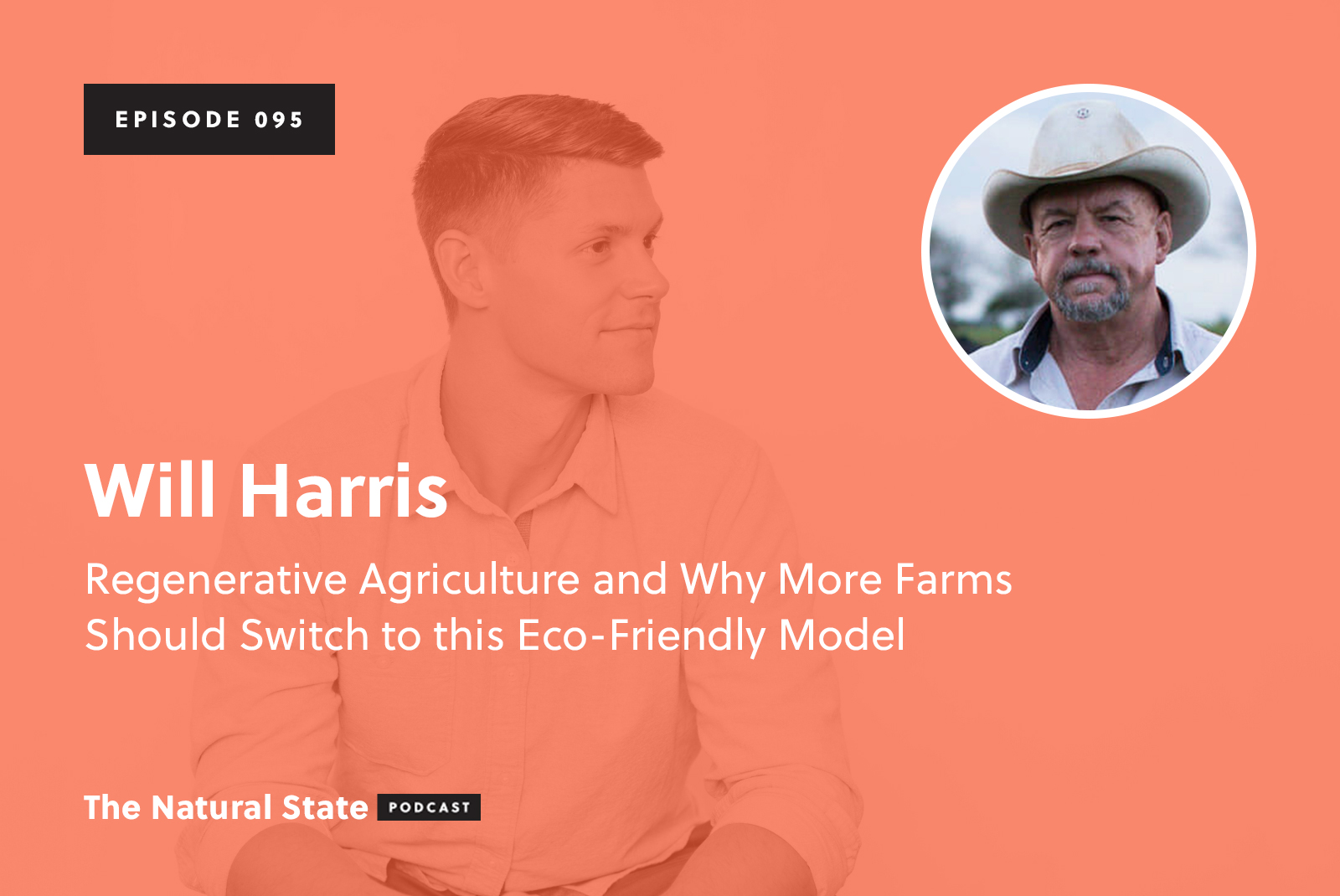His family’s farm, White Oak Pastures, dates back all the way to 1866. So by the time Will Harris took over it, he became a fourth generation farmer.
He followed in the footsteps of his great-great-grandfather, his great-grandfather, his grandfather, and his father before him.
As you’ll hear more about in this episode, Will also went to school for agriculture and he implemented everything he was taught there on his family’s farm.
But after 20+ years of doing this, he had a gut instinct that this wasn’t the way to run the farm, despite everything he had been taught in school.
He followed his instincts and radically transformed his family’s farm going back to the methods his great-great-grandfather used.
And now Will Harris uses a regenerative agriculture approach on his farm, which benefits his animals, the environment, and the people on the farm and in the local community surrounding it.
Will explains why that is in this episode and he also dives into how his farm went full circle — from using industrialization and commoditization after WWII to taking a humane animal husbandry approach and focusing on environmental sustainability.
You’ll also hear more about how this approach isn’t the most profitable and why that doesn’t matter to Will.
Will also describes the issues he faced early on and why he continues to hit roadblocks despite doing the right thing.
If you’re not familiar with the term “greenwashing,” you’ll also discover what that is, why it’s so detrimental, and how big corporations are continuing to deceive people.
The mistake we’ve made so often is to apply reductionist science to a complex system like a farm. In doing so, you get unintended consequences. Click To TweetOn top of being a fourth generation farmer, Will has become a leader in the humane animal husbandry and environmental sustainability space.
He’s the immediate past President of the Board of Directors of Georgia Organics and the Beef Director of the American Grassfed Association.
Will was even selected as the 2011 Business Person of the year for Georgia.
And the reason he’s held such prestigious honors is because he’s not profit-driven, which you’ll hear more about when you tune in.
Will cares about keeping mother nature happy along with making sure his animals and the people surrounding them are taken care of properly.
To say Will is a leader in this space is an understatement. He’s paving the road for a better future and ensuring that both present and future generations to come will benefit from the hard work his family’s farm puts in today.
Because of that, I can’t wait to share this episode with you.
Here’s a peek at the topics Will and I cover:
- What a day in the life of Will Harris, a fourth generation farmer, looks like and how he manages 5,000 acres of land and 160 employees
- How Will’s family farm has changed over the years, including what changes World War II brought with it
- The negative consequences his family’s farm endured due to industrialization and commoditization
- How long it took his family’s farm to recover from this and the year he started transitioning it
- Why Will follows the teachings of Allan Savory and what he put into practice after learning his ways
- More about reductionist science and why it doesn’t work in all cases, including when it comes to farming
- Will also shares his background and what he put into place after graduating and why this didn’t work for him
- The pivotal point in Will’s career that he realized something needed to change
- What changed after this point
- What’s the typical timeframe for a monocrop based farm system to change over to something like regenerative farming?
- The consequences of monocrop farming
- How the organic matter in soil changes from a monocrop system to regenerative farming
- What it’s going to take to shift public opinion towards regenerative agriculture
- Will also shares what he chooses to grow on his land and why
- How he assesses his land to see what needs to be changed
- Why he used to sell his meat wholesale and why he no longer does
- What made him transition his way of harvesting meat
- Why he later switched how his farm produces, harvests, and packages what he grows on his land
- How Will came up against greenwashing, what that is, and why it’s completely unethical
- How the distribution of food needs to change to make a difference
- How Will’s family uses every part of the animal
- How to tell if the meat you’re buying is produced on a farm that takes into consideration the welfare of the animals
If you enjoyed this episode, subscribe to the Natural State Podcast on iTunes to get automatic updates. Use Android? Click here to subscribe on Stitcher and here to subscribe on Google Play Music.
Mentioned in This Episode
- Will Harris’ White Oaks Pastures website
- Will Harris’ White Oaks Pastures Twitter, Instagram, Facebook, and YouTube channel
- White Oaks Pastures Land Regeneration
More Resources
- The Natural State Podcast Episode 076: Jesse Griffiths – Hunting for Better Food Quality
- The Natural State Podcast Episode 078: Robby Sansom – The Benefits of Regenerative Agriculture
- The Natural State Podcast Episode 082: Dr. Paul Saladino – Sustainability of Meat-Based vs. Plant-Based Diets
- Is Eating Meat Bad for The Planet?
- Is the Impossible Burger Healthy?
